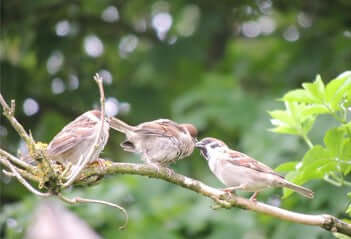
Enhancing Your Garden: The Importance of Bird Food Variety
Share
Birds favour different foods at different times of the year. Read this blog to find out which birds benefit from specific foods to help their diet.
Wild birds benefit from feeding different bird food diets at different times of the year, for example, as the breeding season approaches, birds may naturally favour a bird food that's richer in protein or they may search for grits and minerals to increase their calcium intake.
A wild bird's diet is unlikely to be constant unless it's a regular visitor to a feeding station. In which case, the feeding station will provide the constant staple; however, the bird will still venture off to supplement its diet through natural enrichment - looking for extra protein amongst other things. Scarcity in natural enrichment ultimately encourages birds to move on or, more dramatically, to migrate. Other birds may adjust their diet to counter the ebb and flow of 'natural' food such as grubs and insects.

'Birds favour different foods at different times of the year,' explains Bill Oddie. 'In summer "soft" live foods are favoured by, for example, Blue and Great Tits, and the nestlings are fed nothing else. You can help enormously by providing mealworms. However, the same species have to change their diets in winter, when insects are not available. The tits switch to berries, nuts and seeds. Mealworms and "soft foods" will be even more welcome then, along with the traditional peanuts and fats. High energy niger seeds are also very popular, especially with the small finches.'
A bird's age can affect its diet. Birds instinctively know, for example, that there's nothing better than protein-rich foods (such as insects) for youngsters.
Acknowledging that a wild bird's diet is seldom constant can improve the nutrition available in one's garden for birds overnight. Working on a basic principle that, providing a good staple diet - such as Huskfree Advance or High-Energy Extra - breaks the back of the daily forage for food and provides extra time for natural enrichment. We can leave it there, or, we can go one step further still and add variety; experimenting with different seeds and foods as advised above by Bill Oddie. If you do like the sound of that, the perfect opportunity is about to present itself as spring and the breeding season are both hedge-hopping ever closer to our gardens each day... The opportunity is to feed mealworms:
Live foods are absolutely best for garden birds to feed their young – even House Sparrows love them and are often first to the feeding tray. They should be fed all year round. And with our changing weather patterns meaning that natural foods are often in short supply, having a supply of live mealworms in your garage or shed can be a life-saver for both parents and fledglings.
I once heard Bill Oddie describe live mealworms as 'Animated rice.' That's about the best description of them I've ever heard. However, I haven't answered my question yet: how do they know the benefits of each different diet? I don't know, but they do know. Consider a canary in a cage - it's 100% at the mercy of its keeper. If the bird-keeper decides to feed it a diet that's 100% seeds the canary's diet will lack amino-acids and calcium - both are essential for a healthy life. Add a piece of cuttlefish to the cage and something unusual happens - so unusual that we accept it as commonplace; the canary begins to peck at the cuttlefish and the diet is no longer deficient in calcium. Furthermore, it doesn't decide to consume purely cuttlefish from this point forward - it knows (somehow) that this is supplementary.
In the wild, it's much more complex. Birds may extract their calcium from soil, from a puddle, from the mortar in brickwork... So many places.
In my garden, I like to add variety as it's most certainly the spice of life for wild birds - here's what I do:
1. Provide a good staple bird seed diet
2. Provide live mealworms from spring through to early autumn
3. Feed at least two different suet items during late autumn and winter
4. Always provide fresh water
My advice: get the staple diet right for you and your birds and the rest is up for experimentation.
Have fun and I guarantee that the birds will do the same.
Written by Simon H. King
